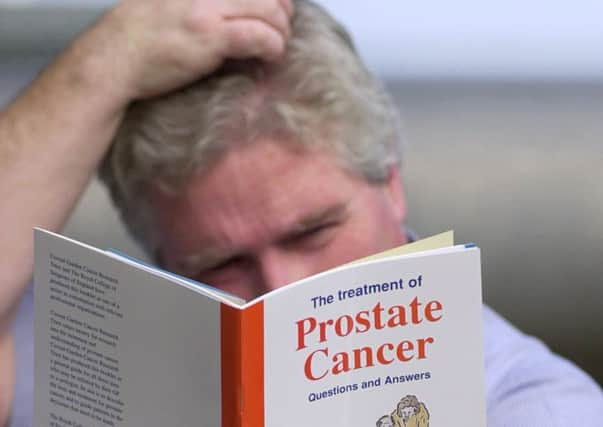Men need to keep fighting against prostate cancer


Survival is the name of the game following a cancer diagnosis. It’s also particularly apposite to any discussion of prostate cancer treatment, as early diagnosis of the disease can offer the best chance of success. That’s of vital importance, too, given it’s now the most common cancer in men, greater than both lung and bowel cancers, with 3,000 new cases every year underpinning a current risk factor for men in Scotland of 1 in 11.
But the news is far from all bad. Men – and their wives and partners – are becoming more aware, albeit slowly, of the illness. Highly skilled care by consultants and clinical nurse specialists continue to make a difference, while general practitioners are increasingly fulfilling a key role as gatekeepers for early diagnosis.
Advertisement
Hide AdAdvertisement
Hide AdFactor in developments in chemotherapy, radiotherapy, robotic surgery and new hormonal drug treatments, and the prospects for patient survival are at an all-time high.
The Scottish Medicines Consortium is due to make important announcements within the next few weeks to decide if new drug treatments such as Abiraterone, Enzalutamide and Radium 223 might become more widely available within the Scottish NHS. The decision-making will be watched with great interest.
The Edinburgh and Lothian Prostate Cancer Group (ELPCSG) believes its awareness work has also made a contribution to figures that show that, compared with 20 years ago, many more men – 84 per cent – are surviving for at least 5 years with prostate cancer.
This work includes the remarkable, inspiring example of Edinburgh businessman and ELPCSG member Peter Phillips. After being misdiagnosed with a back injury in 1990, Peter was told at just 42 that he had prostate cancer which had spread to his spine. His prognosis, with treatment, was that he would have only 12 months to live.
Twenty-five years later, Peter is still on the go, active in business and offering the following advice to patients who have been given a prostate cancer diagnosis: “Be as positive as you can. It’s not a death sentence. You can beat this. You can live with this.”
Peter changed his lifestyle, reducing his intake of dairy, eating and drinking in moderation, and favouring cruciferous vegetables such as broccoli and cabbage. In other words, abiding by the principle that if he looked after his body, his body would do its best to look after him. Medical science was not so advanced 25 years ago and no support group existed for men to share experiences. It’s obviously true that all individuals will differ in the precise nature of their diagnosis, but Peter believes his approach has allowed him to cope with just about every treatment on the prostate cancer checklist prescribed to him over that long period.
While dealing with treatment side effects, he made sure to stay involved with others rather than sit around thinking about his cancer all the time. He reports meeting men who had received a diagnosis and failed themselves in this way, or as he describes it, allowed themselves “to slip away”. In one of his first sessions at the Maggie’s Centre in Edinburgh, he spoke to a psychologist who told him that men who belonged to support groups with prostate and other cancers tended to live longer.
So speaking to and helping other men became a personal mantra, and in doing so he firmly believes that he has also been supporting himself: “You must go and visit the Prostate Cancer Support Group, where you will meet men who have been through the same kind of things as you,” he says. “They will lift a huge weight off your shoulders simply because they’ve been through it themselves.”
Advertisement
Hide AdAdvertisement
Hide AdHe insists mental attitude should remain unchanged: “ Yes, it’s cancer. Then again, it’s now 2015 and cancer is not the death sentence it used to be. The drugs are much better, the surgery more precise, and with so much going on in the field there is lots to be positive about.”
Peter Phillips says he is not foolish enough to think he is not going to die, and possibly of prostate cancer – but he thinks he’ll die of something else. “I was once given 12 months to live”, he says, “but 25 years later I’m still here.” And still setting a superb example to others.
The aim of the Edinburgh and Lothian Prostate Cancer Support Group is to provide support to patients and their families and carers by holding regular meetings in Edinburgh and West Lothian.
• Mike Shaw is a member of the Edinburgh & Lothian Prostate Cancer Support Group For details, e-mail [email protected], phone 0131-208 3067 or visit www.elprostatecancersupport.co.uk